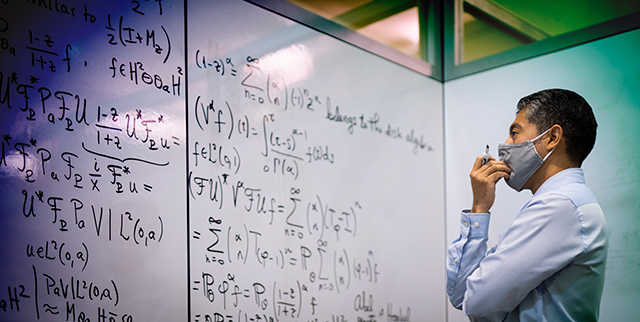Attention Southwest Florida (and beyond): Is your business, industry or government agency grappling with a complex problem? One such as identifying optimal locations for expanded community mental health services, or estimating the cost of rainwater infiltration into leaky municipal sewer systems, or ranking the effect of fan promotions in Major League Baseball?
Well, FGCU Associate Professor Alberto Condori might have the folks who can help you find the answer. Hint: they’re probably walking FGCU’s campus right now.
Confused? Let’s try it this way.

The examples above are not hypotheticals. They’re real-world problems that students elsewhere in the country helped answer through a mathematics program that Condori will begin teaching at FGCU in spring 2022 in the form of a special topics class.
Dubbed simply “Industrial Math,” the course will assign teams of several students – undergraduate or graduate level – a single but broad task to be addressed over the course of an entire semester. Condori, also the graduate program coordinator in the mathematics department, is reaching out to potential external partners throughout the fall semester.
The national program – known as PIC Math, short for Preparation for Industrial Careers in Mathematical Sciences – has already proven its worth in partnerships from New York to Guam.
“It’s kind of a hybrid between an internship and a regular class,” said Condori, who earned his doctoral degree in mathematical analysis from Michigan State and previously taught at Rose-Hulman Institute of Technology in Indiana before turning down other offers to join FGCU in 2010.
“The goal is for them to take ownership of the problem. What are those soft skills they need to address a problem they will be unable to address in a day or a week or even a month?”
The class will tap into one of Condori’s favorite arenas: critical thinking. Whereas traditional classes often teach direct solutions to direct problems, and internships often include tasks well known to employers, the PIC Math program encourages students to plot their own paths to address broad problems that external partners may not know how to tackle.
“I will not be solving the problem,” said Condori, whose victory in a math competition while in community college in Miami helped him earn a scholarship to North Florida, where he earned his undergraduate degree in mathematics and computer science.
“I will help keep the ball rolling. What else do we need? What can we accomplish this week? How do we get there? They will have to develop proficiency in any aspect they need to address that problem. This is a more common scenario that a working professional goes through.”
The PIC Math program was developed by the Mathematical Association of America with support from the National Science Foundation and National Security Agency.
To underscore its critical role bolstering education in STEM (science, technology, engineering and mathematics) and related fields, Condori points to eye-popping federal data.
The U.S. Bureau of Labor Statistics estimates that employment of mathematicians and statisticians will grow 33 percent from 2019 to 2029. That’s compared to just 4 percent for all fields.

“Part of the mission of the university is to nurture community partnerships,” Condori said. “We definitely want to promote programs that serve regional and statewide needs. Everybody wins from this type of endeavor.”
Because there may be legal considerations to possible sharing of proprietary data by external partners, Condori said there is a possibility the class won’t debut this spring. National security, in fact, is one of the areas in which he is exploring a partnership, he said.
But he hopes interest in the program, both with external partners and FGCU students, builds quickly enough that FGCU will be able to offer the class every year.
For Condori, raised in Peru and the first in his family to attend college, that would further feed two of his passions: mentoring ambitious students, particularly those from lesser means, as he was; and solving complex problems not previously answered or even considered.
“I am familiar with the initial discomfort of, nobody knows how to answer this question,” he said, pointing to his research in theoretical math. “OK. Take a deep breath. What can we say about it? Then try to find and create my own tools to answer these questions.
“This will be kind of the same experience for many students, but with a real-world question. It’s not always about being able to address all questions. It’s about knowing, with the skills you’ve developed all those years, that you may be able to find an answer.”
- Check out successful Industrial Math partnerships nationwide at the PIC Math 2020 Student Showcase